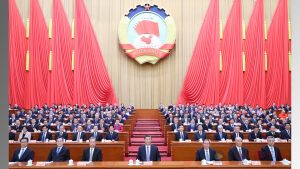
Experts Skeptical: CCP’s Capital Market Reform Measures Unlikely to Avert Impending Economic Crisis
In the face of growing concerns over China’s sluggish economy and its potential global repercussions, the recent reform measures proposed by the China Securities Regulatory Commission (CSRC) are being met with skepticism from experts who believe they won’t be sufficient to avert the looming economic crisis.
The CSRC unveiled a series of measures on August 18 aimed at revitalizing China’s stock market. These measures include a reduction in securities transaction handling fees and the commission rate of securities companies, expansion of margin financing and securities lending targets, improvements to the shareholding reduction system, enhanced transaction supervision, and potential extension of trading hours for the A-share market and the exchange bond market. The CSRC also expressed support for share buybacks and encouraged long-term investment to stabilize the stock market.
However, financial experts argue that these measures are merely superficial and fail to address the fundamental issues at the core of China’s economic downturn. Cold Eye on Finance, an online financial expert, remarked that the reduction in handling fees and other preferential measures might attract investors to the stock market, but they won’t effectively address the broader economic recession. He suggested that the overall economic landscape in China, encompassing the property market, stock market, and struggling Chinese enterprises, remains in a state of decline.
The bankruptcy protection filing by Evergrande Group on August 17 and the default of other real estate giants have exacerbated concerns about China’s economic stability. Financial indicators, such as the depreciation of the renminbi and the weakening Chinese stock market, along with the defaults faced by financial giant Zhongrong Trust, have further eroded global investor confidence in Chinese assets. Foreign capital has been steadily withdrawn, and doubts linger about whether the Chinese Communist regime can salvage defaulted companies.
Despite these challenges, the CSRC’s press conference on August 18 failed to provide concrete solutions to address the pressing issues in the market. Experts called for measures such as the implementation of the T+0 trading system, allowing trading on the same day, but the CSRC cited concerns about heightened market speculation and manipulation as reasons to delay its adoption.
Cold Eye on Finance warned that the core problem in China isn’t how to revive the stock market, but the severity of the ongoing economic crisis. He highlighted the bursting of the 30-year property market bubble, leading real estate companies toward bankruptcy, and underscored the interconnectedness of the property market crisis, banking crisis, and local debt issue. According to his assessment, these factors indicate that China’s economic issues cannot be resolved in the short term and could lead to a protracted recession spanning decades.
In contrast to previous instances where external factors supported China’s economic survival, Cold Eye on Finance expressed doubt that there is any force capable of rescuing China’s economy this time. He speculated that China’s economic crisis might be the final blow for the Chinese Communist Party (CCP), suggesting that a collapse could be imminent. Consequently, he advised against investing in the Chinese stock market at this time.
As the global community watches China’s economic situation with concern, the effectiveness of the CSRC’s reform measures remains uncertain, leaving experts to ponder the potential implications of a prolonged economic downturn and its impact on the CCP’s future.
















Comments